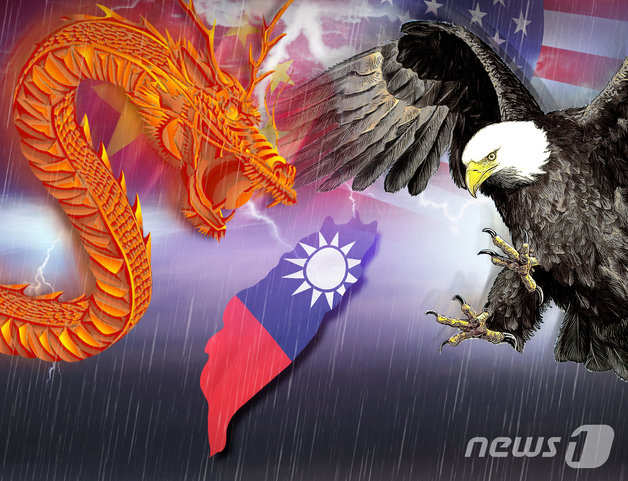As tensions surrounding the Taiwan Strait continue with the victory of the pro-American, independence-oriented Democratic Progressive Party in Taiwan’s presidential election, weight is growing on the idea that China will move to blockade and isolate Taiwan rather than invade it in 2024.
Based on a survey of 52 major U.S. experts and 35 Taiwanese experts in the field of cross-strait relations released by the U.S. think tank Center for Strategic and International Studies (CSIS) on the 22nd (local time), China has the ability to implement a blockade of Taiwan. A powerful invasion was predicted to be virtually impossible.
In this investigation, CSIS defined ‘quarantine’ as the suppression of commercial routes by non-military actors in China, and ‘blockade’ as a blockade using military force to achieve unification within five years.
When asked whether they thought China could fully invade Taiwan, only 27% of American experts and 17% of Taiwanese experts responded ‘yes’ (a combination of very and somewhat yes).
On the other hand, 91% of American experts and 63% of Taiwanese experts predicted that China would begin to quarantine Taiwan. 81% of American experts and 60% of Taiwanese experts viewed the blockade of Taiwan using military force as a possible scenario.
Previously, on the 21st of last month, China withdrew tariff cuts on about 12 chemical products imported from Taiwan, and experts say that quarantine through these commercial measures is the most likely scenario if President-elect Lai takes office.
They also predicted that even if China uses military power to block Taiwan, a direct invasion would be necessary for unification.
 News 1
News 1When asked, ‘Do you think China will be able to force unification through pressure through the blockade of Taiwan?’, he answered, ‘No. While 44% of American experts and 37% of Taiwanese experts answered that “China needs an invasion for unification,” only 6% of American experts and 0% of Taiwanese experts thought that “unification can be forced through pressure alone.” .
The majority of respondents (30%) said that Taiwan would be able to survive for 1 to 3 months without US military intervention if China were to blockade it.
There was no disagreement that the Taiwan Strait crisis would occur in 2024. 68% of U.S. experts were concerned about a Taiwan Strait crisis in 2024, and 58% of Taiwanese experts also said the same.
In particular, when asked, ‘What measures do you think China can take against Taiwan by the end of 2024 in relation to Taiwan’s presidential election?’, experts commonly cited blockade and military training.
To this question, 60% of American experts and 43% of Taiwanese experts answered ‘large-scale military exercises surrounding Taiwan to maximize the effect of the blockade.’
31% of American experts and 49% of Taiwanese experts cited ‘highly coercive non-military measures’.
However, opinions were divided among experts as to when China would take action.
Before Taiwan President-elect Lai Ching-de’s inauguration in May, 19% of American experts and 34% of Taiwanese experts believed that China would increase tensions over the Taiwan Strait.
31% of American experts and 14% of Taiwanese experts predicted that China would begin to exert military pressure immediately after President-elect Lai’s inauguration through summer training of the Chinese People’s Liberation Army (PLA).
On the other hand, 42% of American experts and 43% of Taiwanese experts thought that China would take action after observing President-elect Lai’s policies.
This judgment by experts is consistent with the judgment of high-ranking U.S. Department of Defense officials. Previously, senior U.S. Department of Defense officials said that China’s blockade of Taiwan would be a “monster risk,” but predicted that the possibility of China invading Taiwan was extremely low.
Eli Ratner, U.S. Assistant Secretary of Defense for Indo-Pacific Affairs, said at a hearing of the U.S. House Armed Services Committee in September last year, “(Invasion of Taiwan) is unlikely to succeed, and blockading Taiwan will induce a broad and in-depth response from the international community.” “That’s why China will try to avoid this,” he said.
Army Maj. Gen. Joseph McGee, deputy commander of the Joint Chiefs of Staff, also pointed out, “(Blocking Taiwan) is an option, but it is unlikely to be a military option,” adding, “It is easier to talk about a blockade than to actually block it.”
Rumors of China’s invasion of Taiwan have been consistently raised. In particular, in 2021, U.S. Indo-Pacific Commander Philip Davidson specifically mentioned the period ‘2027’, saying that Chinese President Xi Jinping appears to have ordered the PLA to prepare to annex Taiwan by 2027.
The U.S. Central Intelligence Agency (CIA) also revealed that President Xi had ordered the military to complete preparations to invade Taiwan by 2027.
Christine Gunners, a senior researcher at the Rand Institute in the United States, told The Hill, a U.S. political media outlet, “The blockade and quarantine method is a low-cost and low-risk means of coercing Taiwan.” “It puts a burden on expansion,” he explained.
Source: Donga
Mark Jones is a world traveler and journalist for News Rebeat. With a curious mind and a love of adventure, Mark brings a unique perspective to the latest global events and provides in-depth and thought-provoking coverage of the world at large.